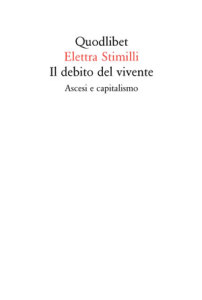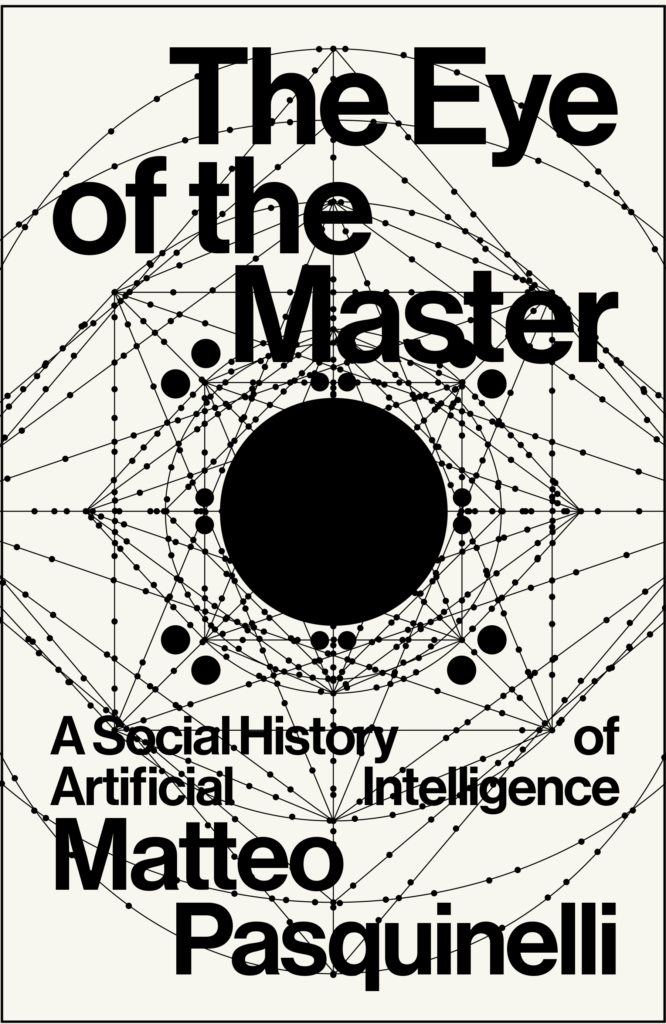Matteo Pasquinelli, Review of Elettra Stimilli’s Il debito del vivente: Ascesi e capitalismo, Theory, Culture & Society, 16 October 2014. → Download PDF
*
Abstract. This book (forthcoming for SUNY Press as The Debt of the Living) reframes the relation between economy and religion along an original genealogy spanning from the early Christian theology to the contemporary studies on debt. Contra Weber and Freud, the current governance of debt is not explained with the traditional schema of repression but as the exploitation of the positive capacity of ascesis. This book in fact criticises the typical conservatorism of political theology (including Agamben) and aims to liberate ascesis against capitalism. Such a philosophical program of agnostic asceticism follows closely the pagan ‘care of the self’ addressed also by the late works of Foucault.
Keywords. Debt; Ascesis; Political Theology; Biopolitics; Max Weber; Carl Schmitt; Michel Foucault.
 Review of Elettra Stimilli’s Il debito del vivente: Ascesi e capitalismo (Quodlibet, 2011), 304 pages, 18€.
Review of Elettra Stimilli’s Il debito del vivente: Ascesi e capitalismo (Quodlibet, 2011), 304 pages, 18€.
The shockwave of the financial crisis has provoked a last-minute monetarist turn in many (also Marxist) political philosophers and urged others to search for the moral roots of debt, that happens to be widely rediscovered as ancestral condition of capitalism (see Graeber 2011 and his modest excursion in “the first 5000 years” of debt). This exclusive role within political ontology was once occupied only by labour and factory struggles. Within western financial capitalism, indeed, “class struggle is today unfolding and intensifying… around the issue of debt”, argues Lazzarato (2012: 7). The new hegemony of the debt governance has affected moral philosophy at large, and countless books remind us today that in German “debt and guilt are expressed by the same word, Schuld” (pitiless nemesis of the Merkel cabinet under a grammatical form).
Elettra Stimilli’s book Il debito del vivente (forthcoming for SUNY Press as The Debt of the Living) follows debt along a more original and timeless genealogy that is related to asceticism, yet without absorbing any religious fatalism along this excursus. On the contrary, her book observes a detached archaeological style, reverses a predictable moralism on the relation between debt and religion and, ingeniously, aims to liberate ascesis against capitalism. This is a book of economic theology, where the contemporary diagram of economic exploitation is found already articulated in early Christian theology (as suggested by Agamben 2011) and where the two pillars, economy and theology, appear to collapse and ruin against each other.
Weber is of course the main scholarly reference to root the capitalistic code of conduct into religion, yet specifically into the modern Protestant ethics as apparatus that prepares the modern homo economicus. Following Agamben, Stimilli amplifies this intutition and expand it until the early Christian theology in order to unbury further figures of the debt relation. Inspired by Schmitt’s famous idea that “all significant concepts of the modern theory of the state are secularized theological concepts” (Schmitt 1985: 36), Agamben himself has attempted to extend the critique of capitalism beyond the simple scale of ethics and to connect the modern notion of economy to the greater divine government of worldly things devised by the early Christian theology.
Stimilli critically crosses all these canonical readings of economy and religion in an independent way focusing specifically on the concept of ascesis. Contra Agamben, Stimilli reclaims ascesis as a powerful activity without purpose from the governance operated by both religion and capital. Her politico-philosophical program can be described as a form of agnostic asceticism, that is equivalent to and follows closely the pagan ‘care of the self’ of the late Foucault (1990).
The timely question that Stimilli poses (to Weber and Freud to start with) is: how can philosophy describe an economic regime that appears to be no longer based on the repression of desire, but on the imperative of enjoyment? The main thesis of the book is that neoliberalism exploits the autotelic power of the human (the Kantian finality without purpose) and subjugates it to the new cult of the free entrepreneur and, more recently, to the debt governance. Ascesis is the normative openness of the human that is exploited by capitalism against the traditional model of repression (as found in Weber and Freud).
Schematically, the book discusses the issues of debt and ascesis in the following constellations of authors: chapter 1 reads Weber and the Protestant ethics via Mauss and Bataille; chapter 2 reads Saint Paul’s oikonomia and the struggle against the ‘flesh’ via Schmitt and Agamben; chapter 3 covers the Catholic-Protestant debate on asceticism in Germany; chapter 4 reads Benjamin’s essay “Capitalism as Religion” and Marx; chapter 6 engages with the fundamental readings of asceticism by Nietzsche and Freud; chapter 7 approaches the ‘spirit of contemporary capitalism’ and, finally, joins the ascetic ethics of the last Foucault.
Theoretically, Stimilli illuminates a common epistemic grammar of asceticism across all the above mentioned authors. In her account, ascesis appears to be grounded on an epistemic force. Ascesis is the capacity of the human to abstract from their ground, to practice a ‘finality without purposes’. Capitalism just exploits the power to abstract of ascesis, argues Stimilli. This is one of the political focuses of the book, where Stimilli consistently discusses and combines Marx’s notion of ‘real abstraction’, Hayek’s ‘the primacy of the abstract’ and the latter’s influence on the Chicago School.
Stimilli’s political thesis is clearly on the side of Foucault rather than Weber and Agamben. According to Weber, the rise of capitalism was prepared by the Protestant utilitarian ethics of wealth accumulation based on personal sacrifice with no trajectory of ascesis. On the other hand, according to Agamben, the ascetic potential belongs only to capitalism and our mission should be to deactivate the governmental apparatus in order to liberate our inoperativeness. Recalling the last Foucault (1990), Stimilli proposes to reclaim and reactivate the finality without purpose that have been captured by economy and today, specifically, under by a self-reproducing infinite debt.
Stimilli engages mainly with the Continental tradition of philosophy. Despite the references to French and Italian authors, the core of the book seems to be dedicated (like some of her previous works, see Stimilli 1996) to the “divergent correspondence” showed by German and Jewish thought (Schmitt and Taubes) on the topic of political theology. In the broader spectrum of contemporary philosophy, Stimilli’s book prepares an unusual ground common to the disciplines of Christian theology, Foucauldian biopolitics and the studies of the current debt governance, not to mention the whole debate on Saint Paul and universalism (Agamben, Badiou, Zizek, et al.). Stimilli’s agnostic asceticism is a useful lesson for any reading of the current cognitive capitalism and digital colonisation that still struggles to elaborate an epistemic and ethical paradigm to escape these new machinic form of “religion”, like the new cult of the upcoming technological Singularity in front of which, once again, humankind is apparently granted no salvation.
Surprisingly, for her positive and materialistic account of ascesis and for her epistemological focus on abstraction, her book resonates also with the recent neorationalist school of thought (Brassier, Negarestani, et al.) and with the more generic Speculative Realism. The words of François Laruelle can be useful en fin to salute Stimilli’s book also from these latter latitudes: “The spiritual are not spiritualists. They are the great destroyers of the forces of philosophy and the state, which band together in the name of order and conformity. The spiritual haunt the margins of philosophy, Gnosticism, mysticism, and even of institutional religion and politics. The spiritual are not just abstract, quietist mystics; they are for the world” (Laruelle 2014).
References
Agamben G (2011) The Kingdom and the Glory: For a Theological Genealogy of Economy and Government (Palo Alto: Stanford University Press).
Foucault M (1990) The Care of the Self: The History of Sexuality vol. 3 (New York: Vintage)
Graeber D (2011) Debt: The First 5000 Years (New York: Melville House)
Lazzarato M (2012) The Making of the Indebted Man (Los Angeles: Semiotexte)
Laurelle F (2014) “A New Presentation of Non-Philosophy”, online text accessed October 2014. Available at: www.onphi.net/texte-a-new-presentation-of-non-philosophy-32.html
Schmitt C (1985) Political Theology: Four Chapters on the Concept of Sovereignty (Cambridge, MA: MIT Press).
Stimilli E (1996) (ed.) Jacob Taubes: In divergente accordo. Scritti su Carl Schmitt (Macerata: Quodlibet).

